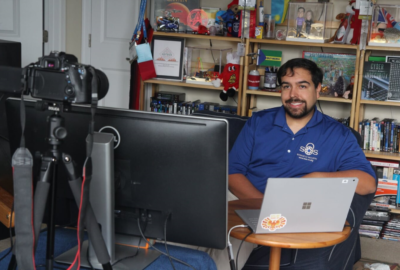
Should the government reinforce its plan for a backup global positioning system?
Former Transportation Department deputy assistant secretary Diana Furchtgott-Roth says it's time to put money behind a DOT plan for thwarting GPS threats.
Best listening experience is on Chrome, Firefox or Safari. Subscribe to Federal Drive’s daily audio interviews on Apple Podcasts or PodcastOne.
The global positioning system on which so much of modern life depends faces two basic threats. One, it’s easy to spoof, placing things at locations other than where they actually are. Second, it’s vulnerable to interruption, say, if another nation wanted to make mischief with GPS satellites. Our guest says it’s time to fund a plan already in place for the Transportation Department. Former deputy assistant secretary of DOT, now teaching economics at George Washington University, Diana Furchtgott-Roth, joined Federal Drive with Tom Temin.
Interview transcript:
Tom Temin: Mr. Furchtgott-Roth, good to have you on.
Diana Furchtgott-Roth: Great to be with you.
Tom Temin: Well, first of all, let’s frame the problem here. What are the threats to GPS as you see them?
Diana Furchtgott-Roth: Well, they’re international threats. So a foreign power could interfere with our satellites. And that would mean that GPS in the United States didn’t work. There’s also possibilities of spoofing either intentionally or unintentionally inside the United States. So there could be interference with your GPS from a utility plant, for example, or someone could decide to get a jammer or spoofer and spoof it intentionally. Spoofing means that if you’re driving down 16th Street, you might find that you’re on Jefferson Davis highway or your navigation system might tell you that you are in Jefferson Davis highway. Or if you’re an ambulance going to an accident in Anacostia your GPS might tell you that you were in Oxon Hill. So that’s extremely dangerous. And jamming means that your GPS system just does not work.
Tom Temin: Got it. Some of those crazy directions seem to happen on Waze already these days. But with respect to foreign threats, is it possible for them to somehow regionally interrupt or interfere with GPS but not affect it for their own use?
Diana Furchtgott-Roth: Absolutely, because different pods use different types of satellites. So for example, China uses Baidu, Russia uses GLONASS. So they could interfere with our GPS system and leave GLONASS and Baidu working. And in fact, in 2019, the British oil tanker Stena Impero, was lured into Iranian waters in the Strait of Hormuz while its GPS was spoofed by the Iranians told navigators it was in international waters. The ship was captured and its crew was imprisoned in Iran.
Tom Temin: Well could multiband or multiple system receivers solve some of that so that you could get the US GPS or Baidu, or the Russian system on the same device?
Diana Furchtgott-Roth: Well, that would be one possibility. But we do not want to depend on GLONASS or Baidu. What we want to do is have a terrestrial system, a ground system that doesn’t depend on satellites. And there are three separate laws, where Congress has asked the Department of Transportation to put such a ground based system in place. That means that either we will have a backup for the satellites in case something goes wrong with them, and it could be an electromagnetic storm, for example. It does not have to be foreign powers interfering. Plus, it means that even if GPS is working, people would be able to have a check on it. So they would get the signal from GPS and the receiver would be able to check it against a ground based system. That’s why the Department of Transportation last year tested 11 different ground based technologies using a variety of metrics.
Tom Temin: These ground based systems then our radar or some other technology?
Diana Furchtgott-Roth: There are different types of technologies, and it’s 11 different technologies. There are some that work on little towers that are attached to buildings. There are some that work on low Earth orbit satellites, such as the Iridium constellation of satellites. Those are good for rural and maritime, because you can put little towers around on the sea or in vast expanses of rural America. Then there’s other tabs that used to be used by the Coast Guard, used to be the Loran system. And there’s something called ILA Rand, which is an updated Coast Guard Loran system, which has larger towers.
Tom Temin: And you mentioned there are several laws that have been passed on this. What about the funding? Where does this all stand — the idea of an alternate to the GPS?
Diana Furchtgott-Roth: Well, Congress has in the past passed funding laws that say an agency has to do something subject to appropriations without allocating the funding. That’s what’s happened this time. The National Defense Authorization Act of 2017, of 2018, and the Frank LoBiondo Coast Guard Act of 2018. All told the Transportation Department to provide a backup to GPS. They didn’t yet provide the funding. Now, with Washington talking about a major infrastructure bill, it seems the obvious time for Congress to allocate funding for this.
Tom Temin: Are there any estimates of what it might actually run to build something,
Diana Furchtgott-Roth: Estimates range from 50 million to 100 million a year. It is a lot of money, but it’s a drop in the bucket of a $2 trillion infrastructure bill that Congress is talking about.
Tom Temin: Yeah, I was gonna say that’s a rounding error in the bills they’re talking about, because the projects and initiatives listed in the White House summary, all have multiple tens of billions of dollars attached to them.
Diana Furchtgott-Roth: It is, right. And this would be 1 billion over 10 years. So in the scheme of what they’re talking about, it is small,. Although to credit my former boss at the Department of Transportation, Joel Szabat, he said it’s only in the government that you say a million is not a lot of money. So for everyone else a million is a lot of money. To acknowledge to the taxpayer that, yes, 50 to 100 million is a lot of money, but it’s less than what people are talking about for other kinds of things. And plus I think that this falls in the range of what’s called a public good, like national defense, where it’s difficult for individuals to provide it on their own. And it’s difficult once it’s there for one group of people not to use it, and then other people to use it just as street lights as an example of a public good that everybody has to use. You can’t say you use the street lights and you don’t. National defense, if it protects one person, it protects everybody. It’s the same with GPS.
Tom Temin: And there’s a little irony in here because the Loran system is being disabled, it’s old, and is being pulled out is last understanding I had. And at the same time, the FAA is the emphasizing ground based radar in favor of GPS. So the government seems to be of two minds here.
Diana Furchtgott-Roth: Yes, the Obama administration took down the eLoran towers, the Loran towers. So yes, we need to either rebuild those or move to a different system. And our report showed that two major technologies did particularly well. NextNav, which is the ground based little towers, and satelles which are low Earth orbit satellites, but there are many options. And we need more than one technology to backup GPS, because there’s one technology that might be most efficient in cities, where there’s a potential for small towers and devices to be put on telephone poles where you need reception in urban canyons down in basements, then another technology might be more efficient for maritime where you don’t have problems of basements but you have very large expanses of sea.
Tom Temin: Yeah, I was gonna say, what do you do about naval ships and other shipping that is in the middle of the Pacific Ocean? Because without GPS, there’s literally nothing out there.
Diana Furchtgott-Roth: That’s why low Earth orbit satellites are very, very helpful for that, yes. These are already up in the air by the way. There’s constellations of satellites that are being used for other purposes, low Earth orbit satellites, unlike the satellites up in the air that right now.
Tom Temin: Right. The low Earth satellites have the capability of providing geo-positioning data.
Diana Furchtgott-Roth: Exactly. Yes, yes.
Tom Temin: And just a final question, do some of these ideas, some of the systems plan, say the towers in the cities where the low Earth orbit satellites — do they get their original orientation from GPS, and then they’re good to go?
Diana Furchtgott-Roth: Now, these would work without the major constellation of GPS satellites. These would work on their own without the satellite.
Tom Temin: And by the way, what do we know about the age and lifecycle of the main GPS satellites? How are they doing?
Diana Furchtgott-Roth: The United States stands up additional satellites, and there are new satellites being put up. So some of the satellites are aging, but we have new satellites to replace them. So it’s not the aging of the satellites that’s the problem. The problem is that they’re vulnerable to interference by foreign powers or jamming or spoofing on the ground.
Tom Temin: Okay, well, then it’s up to Congress, I guess, to put the money here. Is there any Gambit that you’re aware of on the Hill that says, hey maybe we should go ahead and do this.
Diana Furchtgott-Roth: That’d be letters from groups of Republican and Democrat members urging this to happen. So we hope that the White House is going to move forward with this and the Department of Transportation is going to be able to build on a report that was issued in January. And if any of your listeners are interested, they can just google DOT complimentary backup report and it comes right up.
Tom Temin: Diana Furchtgott-Roth is adjunct professor of economics at George Washington University. Thanks so much for joining me.
Diana Furchtgott-Roth: Well, thanks so much, Tom. It’s great to be with you.
Copyright © 2025 Federal News Network. All rights reserved. This website is not intended for users located within the European Economic Area.
Tom Temin is host of the Federal Drive and has been providing insight on federal technology and management issues for more than 30 years.
Follow @tteminWFED
Related Stories





